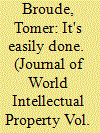| Srl | Item |
| 1 |
ID:
099170


|
|
|
|
|
| Publication |
2010.
|
| Summary/Abstract |
This article examines the implications of the World Trade Organization (WTO) China-Intellectual Property Rights Enforcement case for the relationship between human rights law and trade-related intellectual property law. It shows that, despite the theory whereby international trade law can spontaneously support the freedom of expression and possibly other human rights, the parties and the panel were, in practice, oblivious to the human rights context of the dispute. In the WTO, human rights considerations will be integrated with international trade law (and intellectual property law within it) only if a party makes explicit arguments to this effect, and a panel opts to consider such arguments on their merits, not through issue avoidance.
|
|
|
|
|
|
|
|
|
|
|
|
|
|
|
|
| 2 |
ID:
169322


|
|
|
|
|
| Summary/Abstract |
More than 3,000 international investment agreements (IIAs) provide foreign investors with substantive protections in host states and access to binding investor-state dispute settlement (ISDS). In recent years, states increasingly have sought to change their treaty commitments through the practices of renegotiation and termination, so far affecting about 300 IIAs. The received wisdom is that this development reflects a “backlash” against the regime and an attempt by governments to reclaim sovereignty, consistent with broader antiglobalization trends. Using new data on the degree to which IIA provisions restrict state regulatory space (SRS), we provide the first systematic investigation into the effect of ISDS experiences on state decisions to adjust their treaties. The empirical analysis indicates that exposure to investment claims leads either to the renegotiation of IIAs in the direction of greater SRS or to their termination. This effect varies, however, with the nature of involvement in ISDS and with respect to different treaty provisions.
|
|
|
|
|
|
|
|
|
|
|
|
|
|
|
|